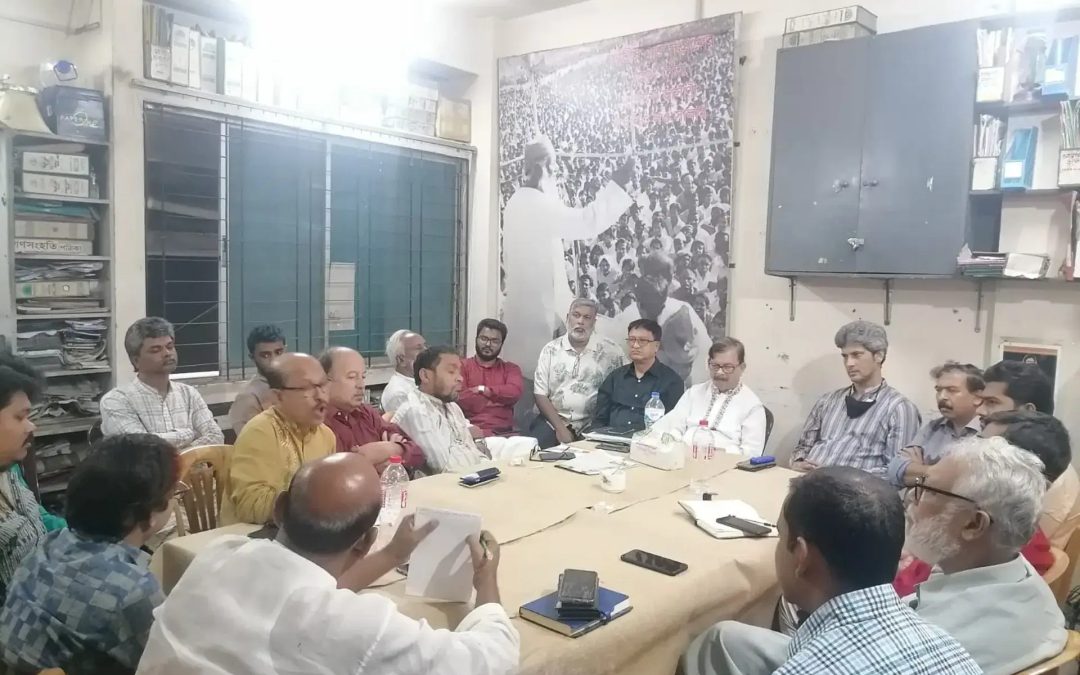On Saturday, the Mass Solidarity Movement headquarters hosted a gathering of Democracy Mancha leaders. | Photo: Collected
The Democracy Forum has sharply criticized recent political crackdowns in Bangladesh, denouncing threats against opposition leaders, including a warning to send BNP Chairperson Khaleda Zia back to prison. The Mass Solidarity Movement’s office in Dhaka hosted a meeting on Tuesday where the Forum denounced the government’s purported suppression of democratic rights, which included mass arrests, case filings, disruptions of political gatherings, and transportation blockades.
The Forum particularly took aim at Prime Minister Sheikh Hasina’s stern warning to opposition parties, calling it a reflection of the government’s political bankruptcy. “This rhetoric proves the government is desperate to silence dissent and cling to power,” read a statement issued after the meeting.
Growing Economic Woes and Energy Crisis
Forum leaders painted a bleak picture of the nation’s current condition, holding the government responsible for economic mismanagement, rampant corruption, and spiraling commodity prices. They claimed these factors have driven both lower- and middle-income households into severe food insecurity.
Their remarks centered on the ongoing energy crisis. Frequent load-shedding, coupled with shutdowns of factories—including fertilizer plants—due to fuel shortages, has exacerbated public suffering. The speakers accused the government of failing to ensure energy security and criticized its inability to manage the power crisis effectively.
“The crisis is a direct result of the government’s greed and incompetence,” said Jonayed Saki, chief coordinator of the Mass Solidarity Movement, who chaired the meeting. “In addition to being totally legal, speaking out against this wrongdoing is a basic political right.”
Accusations of Fascist Tactics
The Forum also criticized the government for its alleged use of strong-arm tactics to suppress political movements. Speakers highlighted incidents where police and affiliated groups disrupted opposition rallies and imposed strikes through the bus owners’ association to stifle dissent.
Mahmudur Rahman Manna, president of Nagorik Oikya, remarked, “The government’s use of force to obstruct protests reveals its authoritarian mindset. This approach will neither solve the crisis nor secure its grip on power.”
Other prominent leaders, including Hasnat Qayyum of the State Reform Movement and Nurul Haque of the Gana Adhikar Parishad, echoed these sentiments, asserting that suppressing opposition voices through intimidation and violence undermines the nation’s democratic fabric.
Upcoming Events
The Forum announced plans to commemorate Shaheed Noor Hossain Day on November 10, honoring the martyr who symbolized the fight for democracy. Additionally, they will hold a district rally in Narayanganj on November 18 to rally public support for their cause.
The Democracy Forum’s call for accountability and democratic rights has resonated with an increasingly disillusioned public in Bangladesh, which is grappling with political turmoil, an economic downturn, and an energy crisis. Their message underscores the critical need for dialogue and reform in a country navigating through turbulent times.

